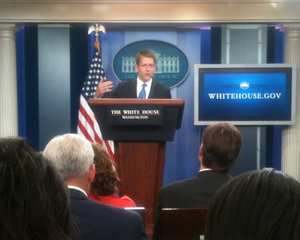News Analysis: White House Briefing Executive Order Talk Raises More Questions Than It Answers
White House press secretary Jay Carney faced nearly eight minutes of questioning at today’s White House briefing on the White House’s announcement on Wednesday evening, April 11, that President Obama would not be taking action to sign an executive order to ban sexual orientation and gender identity employment discrimination by federal contractors.
Questions began when Carney called on NBC News correspondent Kristen Welker and continued with follow-up questions from Metro Weekly and the Washington Blade.
Carney, with several takes on the same answer, said initially:
The president is dedicated to securing equal rights for all LGBT Americans, and that is why he has long supported an inclusive Employment Non-Discrimination Act …. The president is committed to lasting and comprehensive non-discrimination protections and we plan to pursue a number of strategies to obtain that goal. Our hope is these efforts will result in the passage of ENDA … which is a legislative solution to LGBT employment discrimination. And I would make the comparison here that that strategy, the passage of ENDA, is very similar to the approach the president took for the legislative repeal of “Don’t Ask, Don’t Tell.”
Later, specifically as to the executive order proposal, he said:
I think that DADT repeal is instructive here in terms of the approach that we’re taking at this time, and though it is not our usual practice to discuss executive orders that may or may not be under consideration, we do not expect that an EO on LGBT nondiscrimination for federal contractors will be issued at this time.
WATCH the Think Progress video of today’s White House briefing:
Carney did not, however, respond directly to any of the repeated questions asked by the White House press corps today.
 The four main unanswered questions coming out of today’s briefing were:
The four main unanswered questions coming out of today’s briefing were:
- If the president supports the Employment Non-Discrimination Act — which would ban almost all private employers from discriminating on the basis of sexual orientation or gender identity — why would he not support an executive order to do so for a portion of the workforce?
- If the president has been taking actions under the banner of “We Can’t Wait” to address other areas where Congress has refused to act, why not do so in the case of this proposed executive order?
- If the president believes this approach is similar to the approach taken with “Don’t Ask, Don’t Tell” repeal, why not — as was done with DADT repeal — take an interim step to lessen the burden of waiting on the legislative action?
- If the president thinks that ENDA is all that is needed to obtain “comprehensive” relief from LGBT employment discrimination, does he think the existing federal contractor executive order that prohibits such contractors from discriminating based on race, sex, religion and national origin — Executive Order 11246 — is redundant or unnecessary in light of the existence of Title VII?
Finally, the overarching question that is ignored in the administration’s stance relates to the current political status: The president’s party controlled both chambers of Congress when the White House was arguing for a “durable” solution to DADT. The president does not, however, have a House leadership that is supportive of ENDA in this Congress, and the bill has no chance of passage. Further, if the president does not take this action now, and loses re-election, that likely means Congress will not be controlled by pro-ENDA leadership and ENDA will be unlikely to become law until at least January 2017.
The final question, then, is simple: Is the president OK with that possibility?
* * *
READ the full briefing exchange below the jump.
THE WHITE HOUSE
Office of the Press Secretary
_______________________________________________________________________
For Immediate Release April 12, 2012
PRESS BRIEFING
BY PRESS SECRETARY JAY CARNEY
James S. Brady Press Briefing Room
NBC NEWS: Jay, the President has decided at this moment not to sign an executive order that would ban workplace discrimination by any federal contractor on the basis of sexual orientation. Based on the fact that the President has made past statements saying that he supports non-discrimination policies in the workplace, why not sign this executive order?
MR. CARNEY: Thank you for the question. The President is dedicated to securing equal rights for all LGBT Americans. And that is why he has long supported an inclusive employment non-discrimination act which would prohibit employers across the country from discriminating on the basis of sexual orientation and gender identity. The President is committed to lasting and comprehensive non-discrimination protections, and we plan to pursue a number of strategies to attain that goal. Our hope is these efforts will result in the passage of ENDA, the Employment Non-Discrimination Act, which is a legislative solution to LGBT employment discrimination.
And I would make the comparison here that pursuing that strategy, the passage of ENDA, is very similar to the approach the President took for the legislative repeal of “don’t ask, don’t tell.”
NBC NEWS: Can you make the distinction between ENDA and signing this executive order? In other words, if he does support ENDA, why not sign this executive order, which relates to a smaller part of the population and get that policy started?
MR. CARNEY: Again, I think that the DADT repeal is instructive here in terms of the approach that we’re taking at this time. And while it is not our usual practice to discuss executive orders that may or may not be under consideration, we do not expect that an EO on LGBT non-discrimination for federal contractors will be issued at this time. We support, as I just said, legislation that has been introduced — the Employment Non-Discrimination Act — and we will continue to work with congressional supporters to build — sponsors, rather, to build support for it.
We’re deeply committed to working hand-in-hand with partners in the LGBT community on a number of fronts to build the case for employment non-discrimination policies including by complementing the existing body of compelling research with government-backed data and analysis, building a coalition of key stakeholders and decision-makers, directly engaging with and educating all sectors of the business community — from major corporations to contractors to small business — and raising public awareness about the human and financial costs of discrimination in the work force.
NBC NEWS: Tico Almeida, who’s the president of Freedom to Work, has issued a statement saying, “This is a political calculation that cannot stand.” Is this a political calculation?
MR. CARNEY: Absolutely not. The President is committed to securing equal rights for LGBT Americans and that is why he has long supported ENDA. I think the President’s record on LGBT issues speaks volumes about his commitment to securing equal rights for LGBT Americans. The approach we’re taking at this time is to try to build support for passage of this legislation, a comprehensive approach to legislate on the issue of non-discrimination.
And I think, again, the approach that we took in bringing about the repeal — working with Congress to bring about the repeal of “don’t ask, don’t tell” is instructive here. And as it did then, our approach to this piece of legislation demonstrates the President’s very firm and strong commitment to non-discrimination and to securing equal rights for all Americans.
WASHINGTON BLADE: Jay, if it’s not going to happen at this time — some sort of commitment to or issue an executive order at a later time?
MR. CARNEY: Well, I’m simply saying that our approach is to focus on trying to build and expand support for passage of ENDA. That is our support. In terms of, again — as a rule — and we try to stick to it here — we don’t talk about executive orders that may or may not be under consideration. In this case, I can tell you that at this time we are not considering such an executive order. We are, however, actively working with stakeholders to build support for passage through Congress of a piece of legislation that would be far more comprehensive than an executive order.
Hey, guys, one at a time.
BLADE: It’s highly unlikely that the Congress will pass it given its current makeup. And the President has issued numerous executive orders under the theme “We Can’t Wait” — has been unable to pass job legislation. Why is the President making this distinction with this LGBQ —
MR. CARNEY: We believe that this is the right approach to achieve success here in a broad and comprehensive legislative action. And at this time, we’re not considering as a part of that an executive order.
Now, there are executive orders that this President has signed and there are executive orders, either real or imagined, that the President has not acted on, and that’s because we look at each issue and we decide on a strategy that we think makes the most sense to achieving the President’s policy objectives.
METRO WEEKLY: Does the President believe that Executive Order 11246 that has been in place since 1965 is redundant to Title VII?
MR. CARNEY: You’re going to have to —
METRO WEEKLY: That’s the federal contractor executive order that has been in place for race, religion and sex since 1965.
MR. CARNEY: I haven’t had that discussion with him, Chris. What I do know for a fact is that this President is absolutely dedicated to securing equal rights for LGBT Americans. I think his record speaks volumes in support of that statement. And I think that the strategy that he pursued and the work that he did with Congress, with allies, in support of repeal of “don’t ask, don’t tell” testifies to his commitment. And you can —
METRO WEEKLY: But unlike “don’t ask, don’t tell”, the executive order route on employment nondiscrimination for federal contractors has a separate portion even in addition to the legislative route that has been in existence since 1965. So this is not the same as “don’t ask, don’t tell.” And why has the President not approached in a similar way to that law?
MR. CARNEY: It is a similar approach to the approach we took to “don’t ask, don’t tell.” Again, I haven’t talked to him about other executive orders here. What I can tell you is we’re not considering an executive order on this at this time. We are focused on a legislative approach, a comprehensive approach that would be much broader through legislation. And we are going to work with stakeholders to try to build support for passage of ENDA.
BLADE: One question before we move on. You’ve said that the President legislatively repealed “don’t ask, don’t tell.” While that’s true, he twice took in this sort of action to (inaudible) discharge authority twice before that repeal legislation was passed. So to say that you need to have legislation to go with administrative action first is not true.
MR. CARNEY: Well, that’s actually not a correction, Chris. It is a separate statement of action and fact. We are not approaching this at this time through executive authority, through an executive order. We are, however — in another demonstration of the President’s firm commitment to securing equal rights for the LGBT community — aggressively pursuing passage of ENDA. And that requires working with stakeholders and building a body of persuasive evidence that this is the right thing to do. And that is what we’re committed to doing.
Support Metro Weekly’s Journalism
These are challenging times for news organizations. And yet it’s crucial we stay active and provide vital resources and information to both our local readers and the world. So won’t you please take a moment and consider supporting Metro Weekly with a membership? For as little as $5 a month, you can help ensure Metro Weekly magazine and MetroWeekly.com remain free, viable resources as we provide the best, most diverse, culturally-resonant LGBTQ coverage in both the D.C. region and around the world. Memberships come with exclusive perks and discounts, your own personal digital delivery of each week’s magazine (and an archive), access to our Member's Lounge when it launches this fall, and exclusive members-only items like Metro Weekly Membership Mugs and Tote Bags! Check out all our membership levels here and please join us today!



















